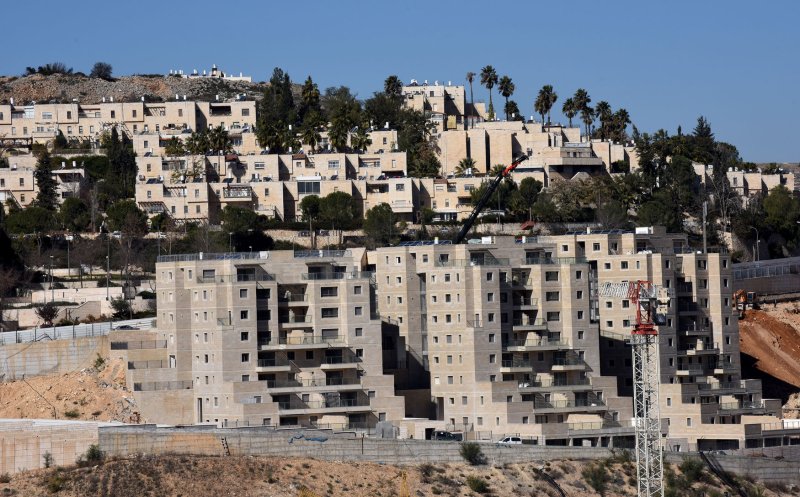An overview of new Jewish housing in the Ramot neighborhood, across the green line, or pre-1967 borders, in east Jerusalem, Israel, on Monday. The Jerusalem Planning and Building Committee, on Sunday, approved the construction of hundreds of Jewish housing units, following the inauguration of U.S. President Donald Trump on Friday. Trump has also pledged to move the U.S. Embassy to Jerusalem. Photo by Debbie Hill/UPI |
License Photo
RAMALLAH, West Bank -- U.S. President Donald Trump has insisted that he is serious about his promise to move the U.S. Embassy in Israel from Tel Aviv, the metropolitan coastal city, to Jerusalem, the focus of Palestinian-Israeli tensions.
The step is not new; many U.S. presidential candidates have promised during election campaigns to move the U.S. embassy to Jerusalem, but none carried out that commitment after arriving at the White House.
The move, it is believed, would spark violence and tensions. It would be a clear contradiction of international consensus regarding the status of the holy city.
Johnny Assi, an expert in international law, said: "Capitals host embassies and other cities have consulates. Even though Israel considers Jerusalem its capital, the world doesn't recognize the administrative measures imposed in Jerusalem by Israel."
The Palestinian leadership, Arab countries, Europeans and the just-departed Obama administration have expressed concerns that Trump will implement the Jerusalem Embassy Act. It was passed by the U.S. Congress in 1995 to relocate the embassy from Tel Aviv to Jerusalem, no later than May 31, 1999.
U.S. Presidents Bill Clinton and George W. Bush, who made the same promise to move the embassy, invoked a waiver, saying a bilateral peace agreement between the two sides was the only way to determine Jerusalem's final status.
Palestinian Authority President Mahmoud Abbas, during a news conference in Bethlehem, called on Trump not to move the embassy, which would hinder the peace process.
"We heard President-elect Trump say this, but we have not been informed of an official position yet," Abbas said. "However, if he decides to move the embassy, it would be an illegal step that would ruin the two-state solution. If this happens, we will have a political and diplomatic response."
Palestinian politicians and experts agree that if Trump moves the embassy, it would be the last nail in the coffin of the two-state solution, the only viable and just solution for both Palestinians and Israelis in the view of more than 70 foreign ministers who gathered Jan. 15 for an international peace conference in Paris.
"This is dangerous. Moving the embassy would counter all measures and agreements reached before. Going back to square one will not be easy for us," said Palestinian Minister of Jerusalem Affairs Adnan Husseini.
The embassy move would also challenge the Oslo accords, signed between the Palestinians and Israelis and which govern relations between the two sides and leave permanent issues such as the status of Jerusalem, Israeli settlements, security arrangements, international borders and the rights of Palestinian refugees to be resolved jointly.
Tensions have been building following clashes in 2015 at Jerusalem's al-Aqsa mosque, one of Islam's holiest sites, and increasing Israeli settler violence and intrusion into the mosque yard, which they refer to as the Temple Mount.
Assi said the embassy move would not calm the situation in Jerusalem and might result in more tensions.
"Israel's occupation of the city of Jerusalem does not equal sovereignty. Jerusalem is an occupied territory since 1967. The reaction to the move might resemble that of the first intifada," he said.
The city of Jerusalem has always been a sensitive issue that made reaching a solution between the Palestinians and Israel extremely difficult. The Palestinians are adamant that East Jerusalem would have to eventually serve as the capital of a sovereign state of Palestine under the two-state solution. Israel considers Jerusalem its declared undivided capital, which already serves as its seat of government.
The city, however, is not recognized by almost any country as the capital of Israel. The U.S. embassy has been in Tel Aviv — like other countries' embassies — and to move it to Jerusalem would cause many problems, said Ahmad Rabaya, a resident of Ramallah.
"To move the embassy is to recognize that Jerusalem is the capital of Israel, which means the United States will no longer be an accepted broker of peace," Rabaya said. "It will be an official declaration of the failure of negotiations and that the Palestinians have no political, historical or religious rights in the city.
"For decades all we have known was tension, violence and injustice and Trump will only fuel the hatred and violence by denying our right in Jerusalem," Rabaya concluded.
This article originally appeared at The Arab Weekly.















